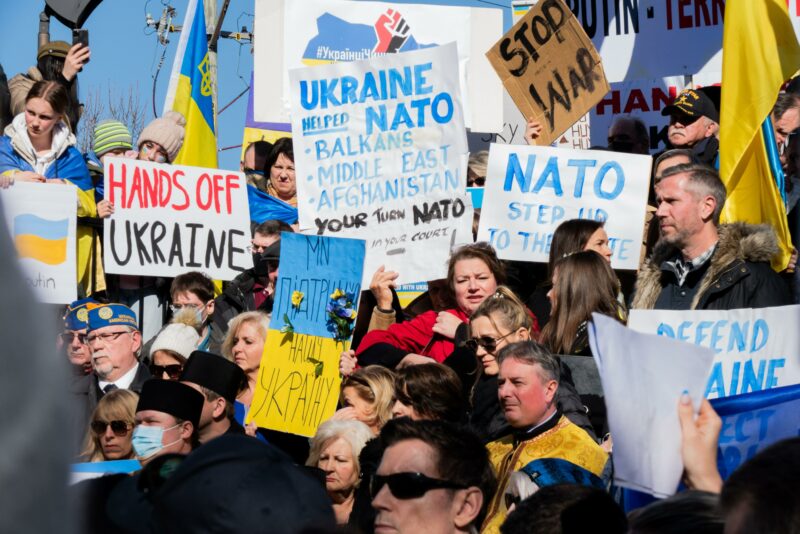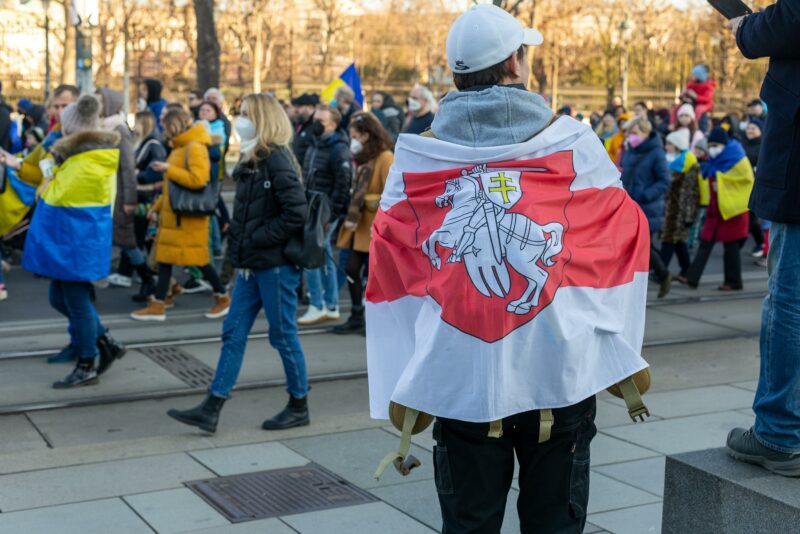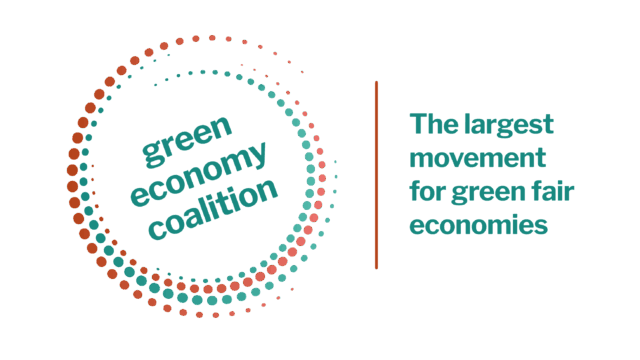Beyond Ukraine: the new geopolitics of green economy
The war in Ukraine has fundamentally reshaped great power politics and the global economy. Here's what that means for the green transition.

The Russian invasion of Ukraine is already a humanitarian disaster, bringing suffering and chaos to millions. It has also fundamentally reshaped great power politics and the global economy, almost overnight. Set against the backdrop of a rising China, resurgent COVID variants, jittery energy markets and an increasingly ineffective US, the Ukraine crisis has made one thing crystal clear: we are in a new geopolitical reality, where the old platitudes and policies no longer apply.
In this context, the need for a redoubled commitment to the values of an inclusive, sustainable and secure green economic transition is stronger than ever. But how can we navigate these chaotic and uncertain times and best focus our efforts towards a greener, fairer future?
Here, we identify five emerging macro trends that are likely to have a huge impact on the prospects for green economic reform over the coming years.
Energy markets transformed
The urgent need to reduce dependence on Russian fossil fuels has given a shot in the arm to green energy & energy efficiency sectors, especially in Europe. With an EU plan to cut dependency by up to 80% inside a year, and consumers struggling with an ongoing cost of energy crisis, hydrocarbons have never looked so expensive and uncertain.
However, fossil fuels are also seeing a short-term boost as countries scrabble for alternatives to Russian gas, oil and coal. German coal, Qatari liquified natural gas, UK shale and North Sea oil are all experiencing a resurgence, and rocketing prices means that fossil fuel producers will be incentivised to produce even more – including from controversial or expensive reserves such as fracked gas. Even the German Green party, now in coalition government, is backing a short-term return to coal out of necessity.
Prices at the fuel pump are certain to be a major factor in the US midterms, with the future of Biden’s domestic agenda now essentially at the whim of major producers like Saudi Arabia (currently barely on speaking terms with his administration). And spiralling energy costs in the UK are already pushing millions into food and fuel poverty – with the only policy responses announced so far coming in the form of regressive cuts to fuel duty and increases in National Insurance.
Russia decoupled, commodities spiking
Western sanctions have effectively unplugged the Russian economy from the global marketplace, virtually overnight. This decoupling of a major economic player is completely unprecedented, with central bank reserves locked down, the Ruble in freefall (if now stabilising) and Russia’s domestic economy now entering a double-digit recession.
In addition to the unemployment, loss of income and immiseration this will bring to ordinary Russians – especially those already marginalised or in poverty – the curtailing of Russian exports in key commodities will have a dramatic impact on global markets. As well as fossil fuels (see above), Russia and Ukraine together produce a considerable percentage of the world’s exported wheat, corn, fertilizer, lumber, aluminium, titanium, iron and steel. For import-dependent economies, shopping at the budget end of the market this is a significant concern.
“ The destruction of much of this export capacity through war, sanctions and protectionist reprisals is already fuelling a commodities super-cycle, with UN global food price benchmarks hitting record highs.”
The destruction of much of this export capacity through war, sanctions and protectionist reprisals is already fuelling a commodities super-cycle, with UN global food price benchmarks hitting record highs. Most affected will be lower-income countries like Pakistan, Bangladesh, Egypt, Lebanon, and Tunisia, as global shortages begin to impact food security for the poorest.
China assertive and ambiguous
With Russia losing most of its access to Western markets, its only alternative is to turn to the East for new markets to sell its exports and investors to prop up its industries. So far, China has remained relatively neutral, torn between Xi Jinping’s personal alignment with Putin (who he sees as a fellow bulwark against US-led Western imperialism), and discomfort with a botched Russian invasion which tramples on Chinese shibboleths like sovereignty and non-interference.
China sees itself as the next potential target of the new kind of ‘total economic warfare’ deployed by the West against Russia, and is now looking even more seriously at the creation of its own parallel economic bloc that doesn’t rely on US-led institutions and the dollar. In practical terms, that will mean increased investment in green technology and digital, redoubled attempts to lock foreign governments in Asia and Africa into China’s Belt & Road Initiative, and accelerated efforts towards replacing China’s dependency on export-led growth with domestic consumption.
Xi would rather Moscow hadn’t got into a revanchist quagmire with obvious parallels to China’s own sabre-rattling over Taiwan. But now that Putin has acted, it seems likely that Xi will continue to seek ways to provide soft support for Russia that evade US sanctions – buying grain, diplomatic parroting of Russia’s casus belli, and maybe limited military exports to road-test Chinese technology. In the longer term, we may look back on early 2022 as the prime mover in the emergence of a new Sino-Russian economic bloc, with Moscow very much the junior partner.
COVID-19 still scarring global markets
Domestically, China is grappling with an explosion of the COVID-19 Omicron variant, with its zero-COVID policy now looking fragile. Hong Kong is currently in the grips of a high-fatality outbreak which has already smashed records for mortality and case fatality ratios, and China’s non-RNA Sinovac jabs (which are less effective at slowing infections) and its relatively low elderly vaccination rates mean that other major Chinese cities are in danger of following suit.
As China locks down major industrial and financial centres in an attempt to hold the line, the global economy is likely to be further stressed, with supply chains further impacted and access to Chinese manufactures threatened. Piled on top of this are increasingly unstable Chinese stock markets and a deepening crisis in China’s housing and construction sectors. As the world begins to reopen, the volatile and unpredictable economic impacts of COVID-19 are still very much with us.
Multilateralism on life support
Early signs are that the Ukraine crisis is accelerating the ongoing weakening in global multilateralism that began under Donald Trump, as countries retreat from global institutions and retrench their own regional power blocs. Although NATO has risen from the dead and the European Union is enjoying a moment of unprecedented foreign policy consensus, elsewhere the prospects for international cooperation on pressing issues like climate, poverty and biodiversity loss look increasingly fragile. The remainder of the BRICS bloc has been passively neutral in response to renewed conflict between former (and diminished, in relative terms) first and second-world powers, and will not welcome their own priorities being side-lined on the international stage.
EU-China climate overtures are also being called off due to US pressure to isolate China, and China is withdrawing into its own sphere and to what it can do as a unilateral actor (see above). A major UN agreement to tackle the scourge of plastic pollution was nearly completely overshadowed by the invasion, and signals out of the CBD negotiations for a global treaty to protect biodiversity are troublingly bleak.

Global cooperation towards human rights and political freedom has also taken a backseat during the current crisis, with Western governments swallowing their principles in order to court major oil & gas producers like Saudi Arabia and Qatar, and even a rapprochement with Venezuela being considered. And as OPEC leverage increases, the prospects for ambitious multilateral climate action dim further.
As Martin Wolf has argued, these trends taken together suggest that a "global decoupling" is now unavoidable: the fragmentation of the world into regional power blocs, shortening of supply chains, retrenchment of capital, perhaps a division between western-style democracies and the autocracies of Russia, China, and India.
Conclusions
There can be no doubting that Russia’s disastrous war in Ukraine has upended the global economic and political system. Much remains uncertain, but for the work towards building a greener, safer and more sustainable economy, some tentative conclusions can be drawn.
Firstly, the narrative of “green recovery” – which had received at least rhetorical support from governments and business during the COVID-19 pandemic – now has an even harder context to work in, and perhaps a shorter window of relevance. Policymakers will inevitably now prioritise security, sanctions and managing the fallout from Russia’s economic meltdown, leaving less space for considerations of inequality, biodiversity, climate and sustainability.
However, this focus on security also creates an opportunity. As European governments scrabble to get off Russian hydrocarbons, the promise of renewables as a cheap, resilient and secure energy source is harder than ever to ignore. Germany’s centre right now refers to renewables as “freedom energy” – free from foreign control or volatile price spikes. And the emerging consensus in Europe about the need for strategic autonomy, security of energy supply and an end to dependence on foreign dictators for their fossil fuels can only benefit green deals, decarbonisation and clean energy investment. As Clem Cowton put it, “heat pumps are patriotic now”.
“ It is also clear that things cannot continue as they were; we stand at the threshold of a new epoch in global economics, politics and power relations.”
Finally, the very uncertainty of this moment, with so much in flux and unclear, creates a space for powerful new narratives to emerge. It is clear that many of the seeds of the current conflict were sown by a flawed economic system – from its dependence on fossil fuels to its toleration of the graft and money laundering that empowered the Russian oligarchy.
It is also clear that things cannot continue as they were; we stand at the threshold of a new epoch in global economics, politics and power relations. Freedom, democracy, and the preservation of a liveable planet demand that we rise to this challenge, and in solidarity with Ukraine push for a safer and more sustainable world.
- Ben Martin, Chris Hopkins, GEC


